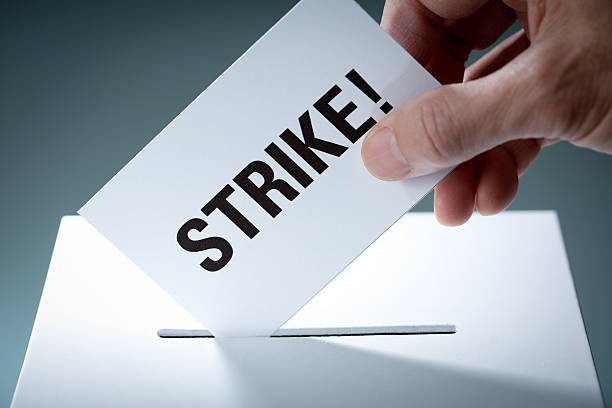30 June 2022
All Out Now!
Strikes.
By Lynda Goetz

It seems that because so many people can now work from home, the support for the RMT Union strikes has increased from 37% to 42%. In other words, because the public have been less affected by railway workers’ strikes than they anticipated, their antipathy to workers striking in support of their pay demands and restrictive practices has decreased. However, that news does not really bode well for the railway workers as it also evidences the fact that the impact they can have on the travelling public is less. What happens when it comes to doctors, teachers and barristers, however?
News recently that junior doctors and GPs are threatening strikes, that barristers have already started strike action and that the largest teachers union is proposing to ballot its members in the autumn, all suggest a cause for concern and perhaps recognition of the fact that all is not well in the world of work. Teachers, and in particular teachers’ unions, are well-known to be left-leaning, but doctors and barristers? Barristers are often, in the public mind, lumped together as one amorphous group along with solicitors, labelled ‘lawyers’, often with the tag ‘fat cat’ added for description. However, within this group there are different affiliations, political allegiances and aspirations. Corporate (ie commercial) lawyers, whether solicitors or barristers, earn well. However, those who are more idealistic and wish to dedicate their services and abilities to those at the bottom end of society are not well paid. Statistics do not serve well here, because the range of remuneration is vast and any averaging tends to make them meaningless. At the bottom, those working in the criminal justice system tend to be quite poorly paid under the legal aid system. It is this group which has been taking strike action.
According to an ITV news item last week, strike action is set to last for a month and will total 14 days of strikes. The Criminal Bar Association (CBA) which represents criminal barristers, said that 300 barristers have left the profession over the last five years and that 40% of junior barristers left in the space of one year. To put these figures into context, the total number of barristers in the UK is only just over 17,000; of these, just over 13,000 are self-employed (normally grouped together in ‘chambers’)*. According to the CBA’s website it exists to support the approximately 2,400 specialists in criminal law. Thus, the loss of some 300 barristers over a period of five years represents a significant proportion of specialist practitioners. What then is wrong, why are they striking and what impact will this have on the public?
The problem is that the legal aid budget (the means by which criminal barristers are paid) has effectively decreased in recent years and the average pay of newly-qualified barristers in the criminal and family courts has only been around £20,000, which means of course that some are earning far less than this, indeed as low as £12,200, which, for the hours worked, is well below minimum wage. The more barristers leave, the more trials are likely to be postponed due to lack of representation – adding to a severe backlog already built up from the Covid years. This of course puts more pressure on those who remain. The most recent figures from HM Courts and Tribunals Service show there were 358,076 outstanding cases at magistrates’ courts, and 58,271 outstanding cases at crown courts, as of April 2022. Before the first lockdown, there were 38,411 crown court cases. Barristers claim that real wages have decreased by 28% since 2006. The government claims that a 15% pay increase on offer is generous and should be accepted by the barristers. The catch however is that this increase would only apply to new cases and would not be paid until the present backlog has been cleared. This could take years, meaning that for those on low incomes, nothing would change in the meantime. So, is the government prepared to see the legal system collapse or will it somehow have to increase its offer?
As for the doctors, what do they have to complain about? Once again, it is generally the opinion amongst many members of the public that doctors are well-remunerated. Certainly, some are and the more senior, the better the system works for them (well, apart from the pension limitation perhaps). For junior doctors, however, things are not so good. Like the barristers, their pay has decreased in real terms of the last decade or so, to the point where it is being claimed that they are effectively being paid around 22% less than they were in 2008. As in the criminal legal system, this is resulting in defections from the NHS. Junior doctors are leaving to go and work in countries where the years of learning and costs of ongoing education are rewarded. Our loss is Australia, New Zealand and Canada’s gain. As I have written in the past, it is small wonder that the incentives to stay here are minimal, when doctors have to pay all their continuing professional education costs (in NZ certainly these are paid by the employers); are given no time off to prepare for the necessary exams and the HR departments appear to be too busy worrying about defining gender and formulating instructions for ‘birthing people’ to be able to timetable requested holidays for medical staff, as would be normal in any private organisation.
When you consider that on top of this, most junior doctors are paid less than train drivers, it is small wonder there are moves towards withholding labour. 2016 saw the first strikes by junior doctors in 40 years. 2023 look as if it could see a repeat of this action. GPs have also voted in favour of industrial action over new contracts imposed on them, which will force practices to open on Saturdays (although given that vets are normally open on Saturdays, this does not seem unreasonable). Doctors at the annual British Medical Association (BMA) annual conference urged delegates to ‘channel our inner Mick Lynch’. Extraordinary as it may seem, professionals as well as ‘workers’ appear to be in the mood to ‘down tools’ and cause disruption to others in pursuit of their own claims.
Teachers unions have always been militant, but it does seem shameful that after all the disruption and suffering caused to our children and young people during the pandemic, they are prepared at this point to urge members to support a ballot on industrial action if they are not given an ‘undifferentiated inflation-plus’ pay rise. Current government proposals offer an 8.9% rise for starting salaries, but only 3% to more senior staff. The National Education Union wrote to the Education Secretary Nadhim Zahawi on 29th June, demanding ‘sufficient action’ to deflect the call for a ballot in the autumn.
Gone are the days, it would seem, when teaching and medicine were regarded as ‘vocations’. Nowadays, they are a means of earning a living and if that living is not as good as its practitioners feel it should be then they, even as professionals, are ready to ‘channel their inner Mick Lynch’ and go out on strike. In some ways, this does not seem unreasonable. After all, the differentiation which used to exist between the standard of living of ‘professionals’ and ‘workers’ (both are of course workers) has been increasingly eroded over the last few decades. If you have to spend years studying and training to become a doctor with all the responsibilities that entails, only to find that your salary is comparable for many years and without further training to that of a train driver (the training for which takes between 9 and 12 months) then there are probably reasonable grounds for discontent. So, you either work out a way to re-stablish the differentiation or, perhaps, you do as a friend of my daughter’s did and give up being a professional (in her case, a vet) and actually become a train driver. (Apparently she is much happier and earns as much as she did as a vet without the long hours, responsibilities and customer complaints, mainly about costs).
How though should governments deal with this increasing discontent? Clearly, there is no easy answer, but as the world of work evolves and more is done by machines, then we may all have to be careful how we negotiate pay. Train driving (and associated restrictive practices) may be 20thC skills, as driverless trains and less commuting reduce the need for people to carry out these jobs. Increased public support for rail workers may not prevent the inevitable transformation of public transport. The same may well become true of criminal barristers, teachers and doctors, although I suspect the human need for real human interaction as opposed to virtual contact may cause at least certain aspects of these jobs to be carried on by people rather than machines for a longer time. In the meantime perhaps, governments might need to consider very carefully how they proceed with our public health, justice and education systems. They will not work without the human skills which keep them going, but workers likewise might need to consider the responsibilities which go with higher pay and perform accordingly.


